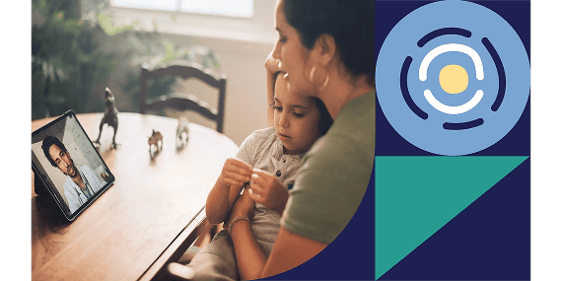Last year’s staggering rise in telehealth utilization was attributable to the COVID pandemic. Telehealth visits peaked at 78 times the normal amount of virtual visits in the first month of the pandemic. That peak has passed, but the increased usage has not – telehealth utilization has since stabilized at 38 times the usual rate of virtual care, according to McKinsey.
With consumers’ lives so connected through technology, and the pandemic accelerating the need for remote digital infrastructure, demand for virtual healthcare continues to rise. But in the long term, it’s likely virtual care’s real value will be as a supplement to in-person care, rather than a replacement for it.
In his recent book, Care After Covid, Accolade chief medical officer Dr. Shantanu Nundy laid out how digitally enabled care utilizes technology to strengthen the trusting relationships between patients and providers that are central to healthcare. These customized, connected and distributed virtual interactions have the potential to improve the health and well-being of everyone. But these digital ties are most valuable when they work to connect the vital human elements of care.
Virtual, relationship-based care
In an increasingly digital world, nobody needs to be convinced of the value of video conferencing platforms in connecting people. But with the addition of further features to virtual healthcare, like at-home testing and message-based communication, many worry about the potential loss of human empathy and relationships that are so essential to getting the right care.
While we should be concerned with maintaining and improving relationship-based care, telemedicine should not be seen as a threat to those relationships, but a tool for cultivating them.
In Care After Covid, Dr. Nundy shared his mother’s experience with utilizing virtual care to take control of her health. The care she received itself wasn’t performed by artificial intelligence or robots—rather, she had a care team of coaches and doctors who she met with from the comfort of her own home. The virtual component of her care only served to make her experience more connected and comfortable.
That’s the promise of telehealth’s future – the ability to make healthcare more individualized, continuous and connected.
Quality care needs digital roots
The sort of digitally enabled foundation that telehealth can help build supports the holistic and comprehensive experience provided by Accolade’s Frontline Care Team. It makes communication effective over a variety of platforms—including mobile messaging and phone calls—to build a trusting relationship no matter the location of the member.
Leveraging digital relationships lets Accolade’s Frontline Care Team send helpful reminders and updates that keep members engaged and on top of their care, including:
-
How’s your new medication working?
-
Don’t forget to fast before your lab tests tomorrow.
-
If your symptoms don’t improve, please call.
This regular communication that meets the member where they are builds the foundation to influence the best health decisions and outcomes.
Digital infrastructure is a foundation for healthcare integration
The growing role of virtual care allows data and technology to improve and prioritize the personal relationships in healthcare. The COVID-19 pandemic’s push for the rapid advent of virtual care is not a replacement for in-person care. Instead, it emphasizes the role that telehealth technologies will play in allowing companies to bridge the gaps in the fractured healthcare landscape, improving care by enriching patient-provider connections with continuous data and communication.
For more information on how members can be supported in receiving the right care at the right time, learn about Accolade’s personalized advocacy solutions and about PlushCare for offering virtual providers.





